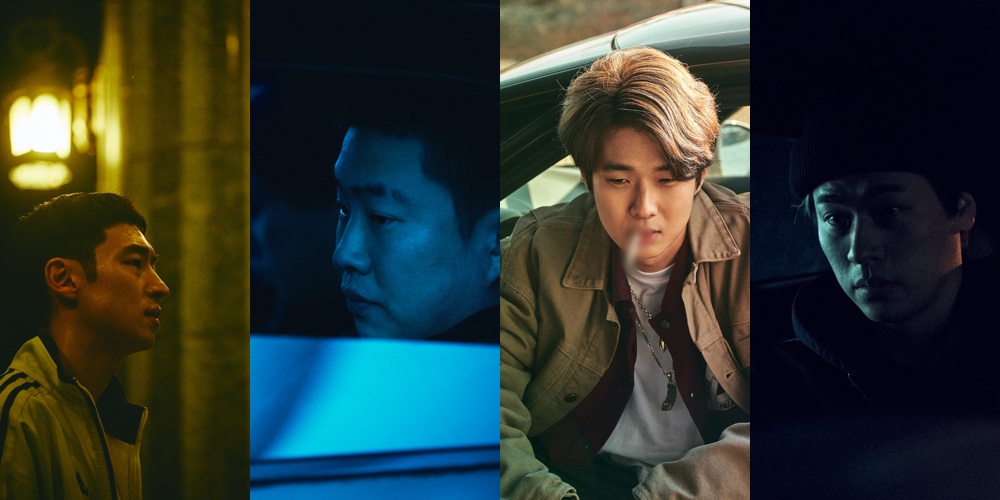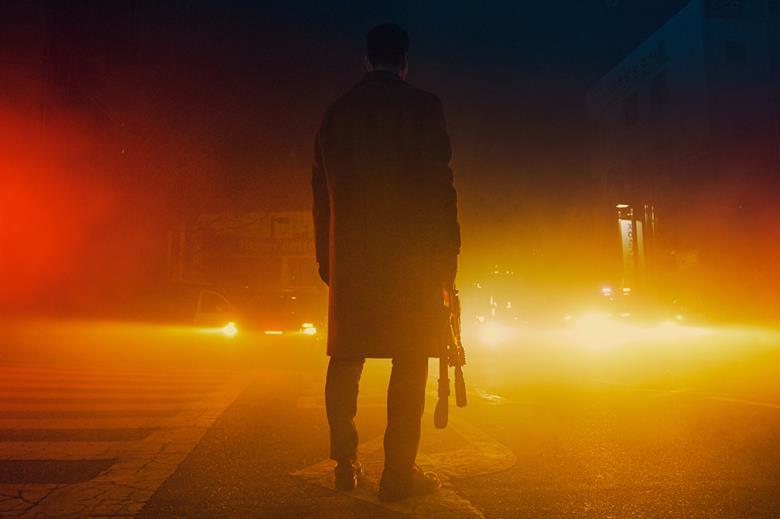
In 1997, a financial crisis swept through Asia, hitting South Korea particularly hard. The once powerful and vibrant South Korean economy eventually had to accept a bailout from the International Monetary Fund (IMF); the bailout imposed significant policy overhauls, which weakened employment laws and imposed austerity measures. Many Koreans perceive that the IMF actually made their economic conditions worse, a perspective highlighted in contemporary Korean cinema. Time to Hunt extends the trauma of the IMF to a near future where once again, IMF loans drive an unfortunate group of South Koreans into poverty.
Director Yoon Sung-hyun’s sophomore feature is set in a dystopian world where South Korean anti-IMF protestors face off against riot police, amidst a blighted city that makes contemporary San Francisco look good. In contrast to the modern and glitzy real-world Seoul, the South Korean capital in Time to Hunt features abandoned shops and cars, with graffiti covering the edifices of empty buildings.

Against this backdrop, we meet a ragtag crew of impoverished young men. Ex-con Jun-seok (Lee Je-Hoon) leads best friends Jang-ho (Ahn Jae-Hong) and Ki-hoon (Choi Woo-Sik), and recruits Sang-soo (Park Jung-Min), in a heist on an underground casino run by a shadowy criminal gang. The heist goes well, enabled by a set of small arms that wouldn’t feel out of place in Hollywood.
The aftermath of the heist doesn’t go as smoothly though. It turns out the criminal gang has vast resources at their disposal. They dispatch a man named Han (the titular “hunter”) to track down Jun-seok’s motley crew. The majority of the film’s two-plus hour running time is dedicated to Han’s pursuit of Jun-seok’s crew, and their attempt to evade death.
The apocalyptic world presented in Time to Hunt reflects modern capitalist Korean society. South Korea still lives in the shadow of the 1997 Asian Financial Crisis. While South Koreans live in a vibrant economy today, many young workers face low wages and harsh working conditions alongside rising property prices and rampant income inequality—conditions that drive them to call their home country “Hell Chosun.” Like the protagonists in Bong Joon-ho’s Parasite, Jun-seok’s lowly friends in Time to Hunt find themselves unable to escape the life of poverty they were born into; thus, they resort to unsavory measures to try to better their circumstances.

Time to Hunt is not a simple action movie. While there are a few shootouts, much of the thrill in Time to Hunt‘s plot comes from its skillful cinematography and sound editing that create an atmosphere of tension and suspense. In one particularly dramatic scene, Jun-seok’s crew tries to evade Han in a parking structure; a car alarm goes off with increasing volume, as more frequent drumbeats from the soundtrack signal increasing danger from Han. From a cinematographic perspective, Time to Hunt makes ample use of panning shots and dutch angles to heighten the sense of tension.
Even the few shootouts in Time to Hunt are fairly reserved compared to Hollywood peers. The film makes numerous references to the fact that South Korean men have to complete two years of mandatory military service, which makes Jun-seok’s crew’s weapons handling much more realistic than Hollywood flicks that see protagonists shoot an unlimited supply of bullets. The few shootout scenes focus more on the tactical elements of movement rather than simply letting a hail of bullets fly, which adds tension.
Time to Hunt isn’t perfect, however. Jun-seok’s crew comes off as fairly amateurish compared against the career criminals they’re stealing from, and plenty of deus ex machina gloss over potential plot holes. In one particularly egregious display, Han holds Jun-seok at gunpoint, only to let him go to give him a “five minute lead” for sportsmanship’s sake.
Still, we’re willing to accept some liberties when it comes to screenwriting if it comes with superior filmmaking execution. It’s much easier to overlook “convenient” escapes for Time to Hunt‘s protagonists when you’re caught up in the dramatic atmosphere of the film.
• • •
Time to Hunt screened at the 2020 Berlin International Film Festival.
